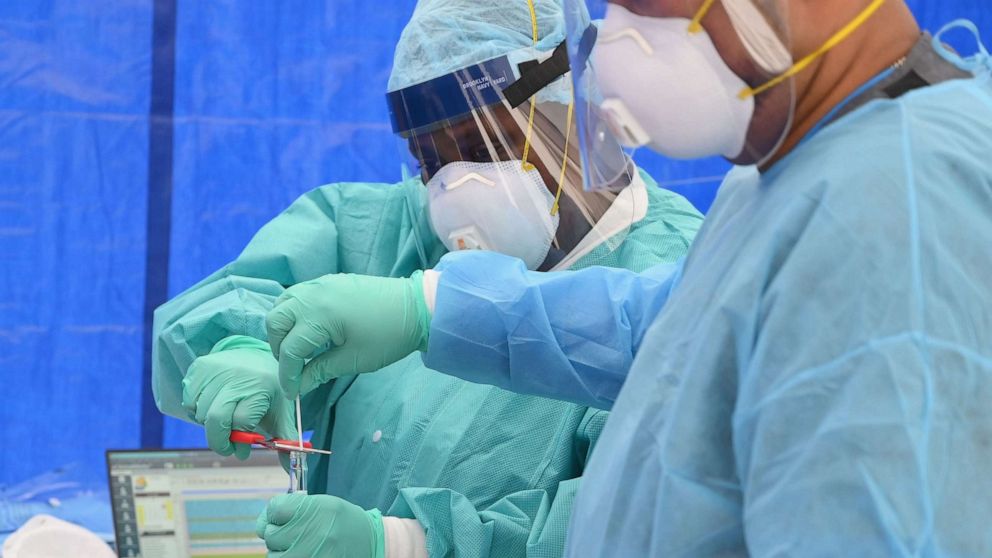Does COVID-19 cause delirium? Doctors race to understand its impact on the brain
As we continue to learn about the novel coronavirus, it's become clear that its effects on the body extend well beyond the lungs. Now, doctors are racing to understand one of its most disturbing targets: the brain.
Doctors across the globe are reporting that their patients with severe cases of COVID-19 are left confused, sometimes delirious or exhibiting signs of an altered mental state.
Though the cause remains a mystery, doctors on the front lines are sounding the alarm, noting that many of these patients follow an eerily similar pattern. For example, one patient -- a man in his 50s -- was admitted to a hospital after he was found confused, agitated and non coherent, all signs of a drastic change to his personality.
At first, doctors thought it was meningitis -- an infection that can affect the brain. They did not initially suspect COVID-19 because the man wasn't experiencing typical respiratory syndromes. To their surprise, the man tested positive for the virus after a routine hospital screening. It was only after he completely lost touch with reality -- unable to recognize who he was or where he was -- that he developed respiratory symptoms more commonly associated with COVID-19. This occurred two days into his hospitalization.
Eventually, the patient was transferred to the Intensive Care Unit (ICU) for invasive ventilation, still unable to comprehend what was happening to him. As of this writing, he remains in the ICU.
Dr. Lorenzo Norris, the associate dean at the George Washington University School of Medicine and Health Sciences and editor in chief of MDedge Psychiatry, said cases like that of this patient are a worrying sign that no one fully understands how this virus is impacting the brain.
Doctors already knew that elderly patients are most likely to become delirious during hospital admissions; however, during the COVID-19 pandemic, doctors are noticing that some younger patients are also exhibiting signs of altered awareness as their only symptom. Others are developing delirium later during their hospital stay, and their confusion seems more severe and lasts longer than expected.
Norris has been in the front line in managing and battling the virus during the pandemic. He told ABC News that his hospital has seen an uptick in the number of patients with COVID-19 who experience delirium, regardless of their prior mental health history. Plus, these patients seem to take longer to recover.
"Delirium is a medical emergency that is associated with increased morbidity and mortality," he said.
Though data is sparse, one study from Wuhan, China found that over a third of patients with COVID-19 experienced some sort of neurological symptom -- and that rate increased among those with severe infections. Additionally, a smaller study from France published last month found that among hospitalized patients with COVID-19, about two-thirds were agitated or delirious.
The confusion manifesting in patients with COVID-19 has now confused doctors, who still don't understand whether it is a direct result of the virus's impact on the brain, or perhaps a side effect triggered by an aggressive inflammatory response.
Dr. Beatriz Korc, chief of geriatrics at Memorial Sloan Kettering Cancer Center told ABC News that the delirium from COVID-19 could be a result of the virus directly damaging the brain tissue or its blood vessels. Alternatively, delirium could also be a result of the severe respiratory distress resulting in low oxygen levels in the blood.
Another possible culprit, according to Norris, is a severe overreaction of the immune system, called "cytokine storms", which could be causing blood clots to form in the brain.
In Spain, one of the hardest hit regions in Europe by the pandemic, Dr. Cristinia Abad, an anesthesiologist at Hospital Clínicos San Carlos in Madrid, noticed that patients who required mechanical ventilation to support their breathing for long periods of time were taking longer to return to their normal selves.
"It was taking a lot longer for patients to return to their baseline mental status after we extubated them," Dr. Abad told ABC News. "We were concerned that they had small clots formed in the brain that were causing them to be more confused, because we knew their oxygen status had improved, so that was not the problem."
It's also possible that long periods of hospitalization could be making the problem worse for some patients, causing them to feel disoriented.
"Isolation, mobility limitations, use of protective personal equipment or absence of familiar faces could be terribly frightening and disorienting, which can further worsen the confusion patients endure," Korc said.
Korc, however, said things like family phone calls and attentive nursing care can help, and that the delirium experienced by some COVID-19 patients likely goes beyond the typical confusion associated with long hospital stays.
With doctors learning more about COVID-19 every day, a growing number are now on the lookout for delirium as a possible symptom. Caught early, delirium can be managed, which can in turn reduce the risk of long-term adverse effects.
"We're learning something new about this virus every day, but there are the concerns from folks on the front line for what will become of patients with altered mental status and COVID-19," Norris said.
Lily Nedda Dastmalchi, D.O., M.A., an internal medicine resident physician at The George Washington University, is a contributor to the ABC News Medical Unit. Imran Ali MD MS MPH is a geriatric medical fellow at the University of Connecticut Center on Aging and a contributor to the ABC News Medical Unit.




